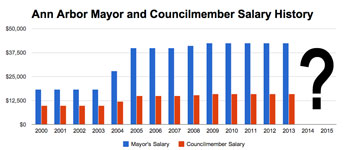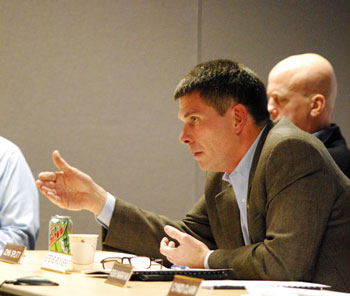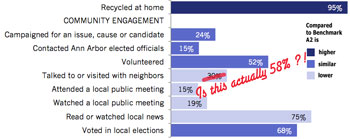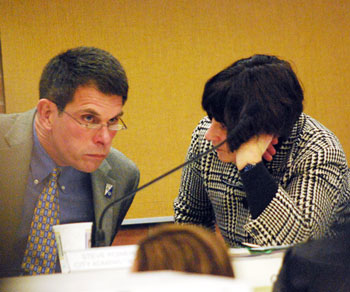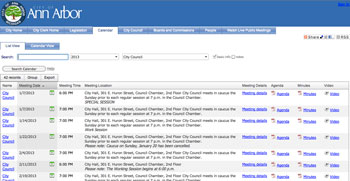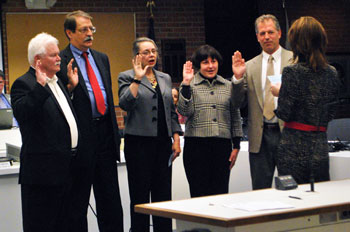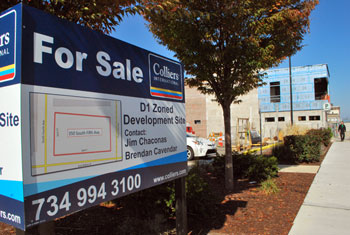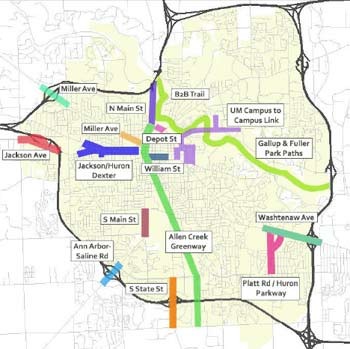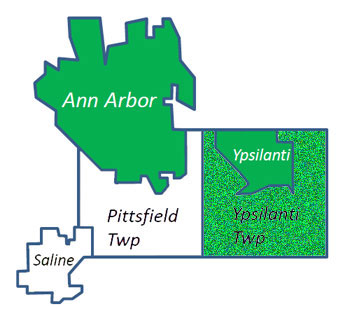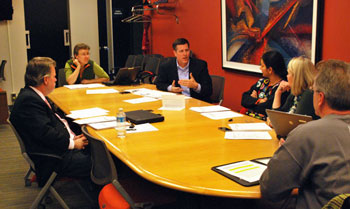Editor’s note: This “Live Updates” coverage of the Ann Arbor city council’s Dec. 2, 2013 meeting includes all the material from an earlier preview article. We think that will facilitate easier navigation from live-update material to background material already in the file.
The Ann Arbor city council’s Dec. 2, 2013 agenda is comparatively light, but might not lead to an especially short meeting.
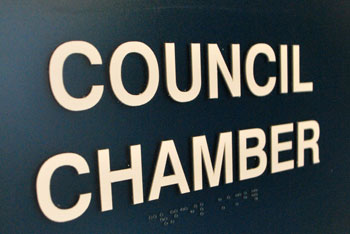
The sign on the door to the Ann Arbor city council chamber, installed in the summer of 2013, includes Braille.
Items that could result in considerable council discussion include final approval of a repeal of the city’s crosswalk ordinance. A scheduled public hearing on that issue could also draw a number of speakers. The council gave initial approval to the repeal at its Nov. 18, 2013 meeting – on a 9-2 vote.
The tally could be closer for the final vote, as mayor John Hieftje, Sabra Briere (Ward 1) and Chuck Warpehoski (Ward 5) could join Christopher Taylor (Ward 3) and Margie Teall (Ward 4), who had dissented on the initial approval. Also a possibility is that a compromise approach could be worked out. The possible compromise would leave intact the language about motorists stopping, but still limit the right-of-way to just pedestrians within a crosswalk – that is, it would not afford the right-of-way to those standing at the curb.
Some of the public’s perspective and council discussion on the crosswalk issue was aired out during the council’s Sunday caucus, held in council chambers at city hall. This week the caucus was rescheduled for 1 p.m. instead of its usual evening start time, to accommodate more discussion of the local crosswalk law. The caucus drew six councilmembers and a dozen members of the public, and lasted three hours.
Another topic that could extend the Dec. 2 meeting is related to the pending sale of the Edwards Brothers property on South State Street to the University of Michigan for $12.8 million, which was announced in a press release last week. A right of first refusal on the property is held by the city of Ann Arbor as a condition of a tax abatement granted by the city council almost three years ago, on Jan. 18, 2011.
There’s some interest on the council in holding a closed session on Dec. 2 to review the options and the impact of those options. Any interest on the council in acquiring the land, which seems somewhat scant, would be based on a desire eventually to put the land back on the tax rolls. The topic of land acquisition is one of the legal exceptions to the Michigan Open Meetings Act, which requires all deliberations of a public body to be open to the public. If the council holds a closed session on that topic, it could extend the Dec. 2 meeting.
One reason the council may have little appetite for acquiring the Edwards Brothers property is that the city has just now managed to sell a downtown property the city acquired 10 years ago – the old Y lot on William Street, between Fourth and Fifth avenues. Approval of the $5.25 million sale to Dennis Dahlmann came at the council’s Nov. 18 meeting. But it’s possible that not all the due diligence will be completed before Dec. 16, when the city owes the $3.5 million principal it used to purchase the property. As a hedge against that possibility, the council will be asked on Dec. 2 to approve a six-month extension on the installment purchase agreement with Bank of Ann Arbor for the $3.5 million.
In the meantime, the minutes of the Ann Arbor Downtown Development Authority’s most recent operations committee meeting reflect the DDA’s expectation that all of the equipment used to operate the public surface parking facility at the old Y lot will need to be removed by Dec. 31, 2013.
The city’s right of first refusal on the Edwards Brothers property is linked to a tax abatement. And on the council’s Dec. 2 agenda is an item that would establish an industrial development district (IDD) for a different property, at 1901 E. Ellsworth, where Extang Corp. and GSG Fasteners are located. Creating an IDD is a step in the process for granting a tax abatement.
Land control and use is a predominant theme among other Dec. 2 agenda items as well.
The council will be asked to give initial approval to a rezoning request for the Traverwood Apartments project – from ORL (office, research and light industrial district) to R4D (multiple-family district). The First Martin Corp. project would include 16 two-story buildings for a total of 216 one- and two-bedroom units – or 280 total bedrooms. The site plan and final rezoning approval would come before the city council at a future meeting. The Dec. 2 meeting will also include council’s consideration of a donation of 2.2 acres to the city from Bill Martin just north of the Traverwood Apartments project site. The acreage to be donated is next to the city’s Stapp Nature Area and the Leslie Park golf course.
At its Dec. 2 meeting, the council will also be asked to approve the site plan for a three-story addition to the Running Fit store at the northwest corner of Fourth Avenue and Liberty Street in downtown Ann Arbor. The first floor will be retained as retail space, but six residential units would be built on the upper three floors – one two-bedroom and five one-bedroom units.
The city council will also be asked to place a value on land currently used as on-street parking spaces – $45,000 per space. By formally adopting that figure, any future development that causes the removal of on-street parking could be charged that amount. It would be paid to the Ann Arbor DDA, which manages the city’s public parking system. In this matter, the council would be acting on a four-year-old recommendation, approved by the Ann Arbor DDA in 2009.
In non-land issues, the council will be introduced to newly hired firefighters at its Dec. 2 meeting. The budgeted staffing level for the fire department is 85. However, the statistical section from the city’s most recent comprehensive annual financial report (CAFR) shows 82 AAFD staff in fiscal year 2013. That’s because the council approved the hiring of additional firefighters after the fiscal year began, bringing the total to 85.
The CAFR itself is indirectly included in the council’s agenda – as part of a presentation that will be given by chief financial officer Tom Crawford on the result of this year’s audit. It was a clean audit that showed the general fund doing about $2.4 million better than budgeted.
Among the other myriad statistics in the CAFR are the number of parking violations recorded by the city – which are again down in the range of 90,000, as they’ve been for the last three years. That’s about half what they were in 2006 and 2007. Those numbers in the CAFR don’t include University of Michigan parking tickets – although the city and the UM have an agreement under which the city processes tickets and hears appeals for the university. A renewal of that agreement is on the council’s agenda for Dec. 2.
On Dec. 2 the council also has a fair amount of its own internal business to wrap up, associated with the seating of the new council, which took place on Nov. 18. That includes adoption of the council rules. Based on a less than 10-minute meeting of the council’s rules committee on Nov. 29, no changes to the rules would be put forward at this time. Based on that meeting, it appears that Sally Petersen (Ward 2) will replace Stephen Kunselman (Ward 3) on that council committee. The rest of the new council committee assignments are also supposed to be made at the Dec. 2 meeting.
The council’s calendar of regular meetings and work sessions will also be adopted at the Dec. 2 meeting. The basic pattern is first and third Mondays for regular meetings, except when there’s a holiday or an election during the week of the meeting.
This article includes a more detailed look of many of these agenda items. More details on other meeting agenda items are available on the city’s online Legistar system. Readers can also follow the live meeting proceedings Monday evening on Channel 16, streamed online by Community Television Network.
The Chronicle will be filing live updates from city council chambers during the Dec. 2 meeting, published in this article below the preview material. Click here to skip the preview section and go directly to the live updates. The meeting is scheduled to start at 7 p.m. Updates might begin somewhat sooner. [Full Story]
